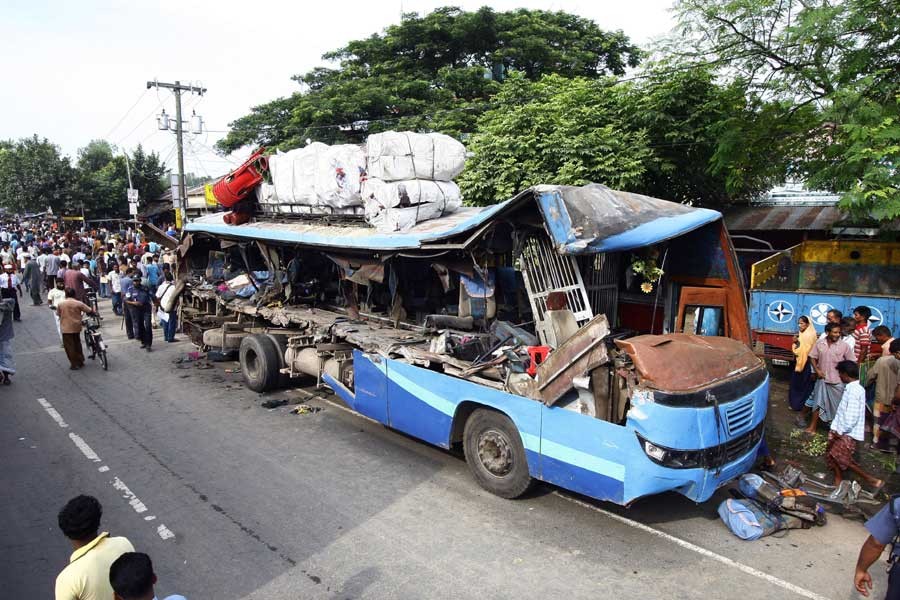Road accidents are quite frequent in Bangladesh than any other countries in the world. Over 3,100 crashes, 2,700 fatalities and 2,400 injuries occurred on roads and highways last year, according to a traffic police report. Another report says some 4,000 people die in road accidents while property worth around Tk.50 billion is damaged annually in Bangladesh.
The rate in terms of the number of fatalities per 10,000 on-road motor vehicles, excluding motorbikes, is very high in Bangladesh (over 50) compared with those in the developed countries. The corresponding fatality rates in developed countries are only about 2.0 per 10,000 on-road motor vehicles.
The annual accidental loss is equivalent to 2.0-3.0 per cent of the country's gross domestic product (GDP) that comes around to Tk 400 billion. In order to contain the accident deaths, Accident Research Institute (ARI) of Bangladesh University of Engineering and Technology (BUET) has recently developed a traffic management system. The institute hopes that the project, Strategic Accident Reduction Programme (SARP), would help, if implemented, cut road accidents by 50 per cent in the country over a period of five years.
Around Tk 31 billion is required to operate the system that includes speed enforcement, accident detection, emergency management, institutional capacity building and advanced research. The project, formulated on the traffic management system, got green signal from the relevant policymakers. It now awaits government's approval.
The project, if approved, will be implemented by Roads and Highways Department, Highway Police, Fire Service and Civil Defence, and Bangladesh Road Transport Authority (BRTA). The system will, however, be controlled by the ARI. The project has been planned to be implemented in two phases. The first phase will cost Tk 15 billion that would focus on decreasing accidents and the second phase to cost Tk16 billion with a focus on research and training.
In its first phase, the project envisages reduction of casualties in road accidents by emergency response and rescue system based on digital communication. Some 2,000 kilometres of main national highways will be divided into 50 blocks. Hi-tech digital speed radar cameras will be installed for every two km to transfer real time information through optical fibre connection.
The second phase of the project has plans to establish 90 driving schools -- 60 for light vehicles and 30 for both light and heavy vehicles to produce 30,000 drivers annually.
According to the findings of a study, over-speeding is responsible for 37 per cent of deaths in road accidents, careless driving for 47 per cent deaths and the rest for other reasons. Yet such accidents, numerically shocking as they may be, fail to truly reflect the social tragedy.
Media reports apart, transport analysts have time and again called for stringent enforcement of traffic rules and regulations. Traffic police seldom carry out routine examination of fitness certificates and other relevant documents of motorised vehicles and driving licences of the drivers.
The country's transport planners should examine the concept of dedicated roads in line with the standard followed by the western countries. In the system, some specific kinds of vehicles are allowed to use such roads for long journeys. On both sides of the dedicated roads, there are side roads for the shops and villages around to use.
The most worrisome aspect is that there is a lack of accountability everywhere. The drivers believe they can get away with road traffic fatalities. On the other hand, the law enforcers seldom show the desired urgency to enforce the rules and regulations, and penalise the violators.
The government has targeted to achieve the sustainable development goals (SDGs) by reducing 50pc of the accidents by 2020. If the government takes up the project developed by the ARI, many believe 50pc accidents will be reduced by the same time.
In the circumstances, what is needed is a comprehensive system of accountability to be in place in order to reduce the number of fatal road accidents.


